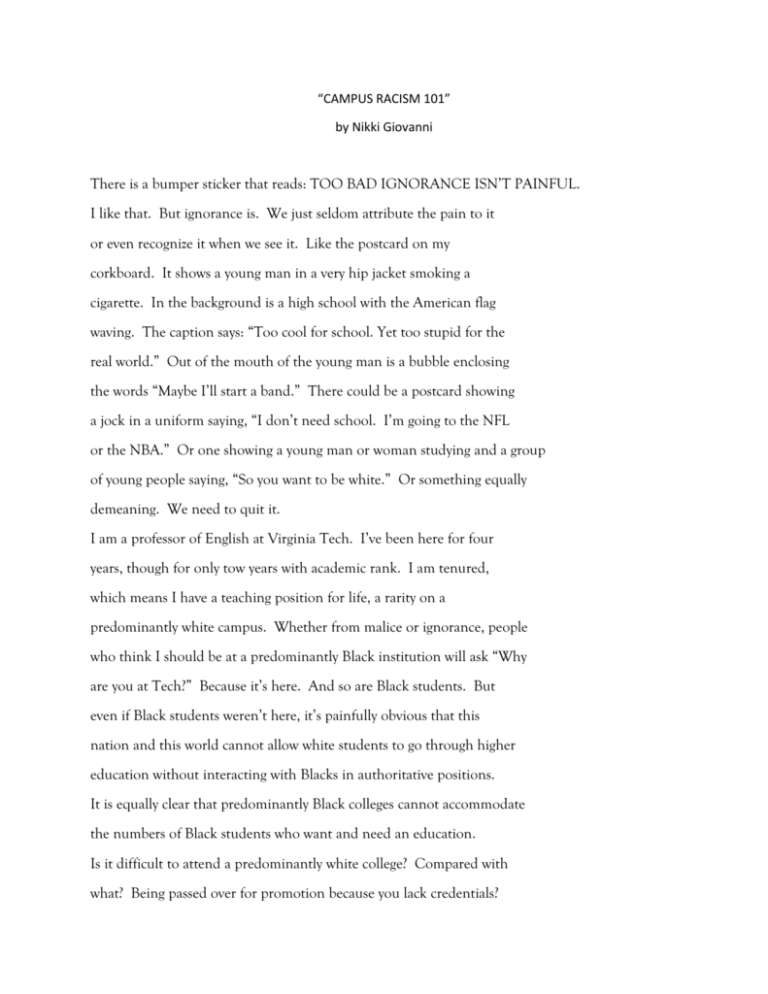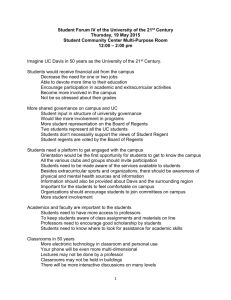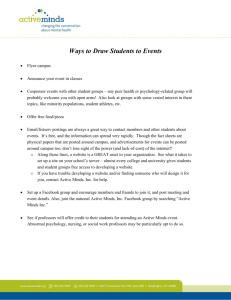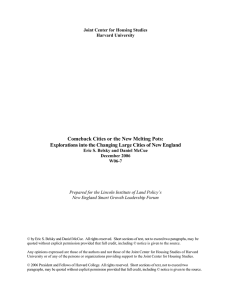Campus Racism 101 - Arlington Public Schools
advertisement

“CAMPUS RACISM 101” by Nikki Giovanni There is a bumper sticker that reads: TOO BAD IGNORANCE ISN’T PAINFUL. I like that. But ignorance is. We just seldom attribute the pain to it or even recognize it when we see it. Like the postcard on my corkboard. It shows a young man in a very hip jacket smoking a cigarette. In the background is a high school with the American flag waving. The caption says: “Too cool for school. Yet too stupid for the real world.” Out of the mouth of the young man is a bubble enclosing the words “Maybe I’ll start a band.” There could be a postcard showing a jock in a uniform saying, “I don’t need school. I’m going to the NFL or the NBA.” Or one showing a young man or woman studying and a group of young people saying, “So you want to be white.” Or something equally demeaning. We need to quit it. I am a professor of English at Virginia Tech. I’ve been here for four years, though for only tow years with academic rank. I am tenured, which means I have a teaching position for life, a rarity on a predominantly white campus. Whether from malice or ignorance, people who think I should be at a predominantly Black institution will ask “Why are you at Tech?” Because it’s here. And so are Black students. But even if Black students weren’t here, it’s painfully obvious that this nation and this world cannot allow white students to go through higher education without interacting with Blacks in authoritative positions. It is equally clear that predominantly Black colleges cannot accommodate the numbers of Black students who want and need an education. Is it difficult to attend a predominantly white college? Compared with what? Being passed over for promotion because you lack credentials? Being turned down for jobs because you are not college-educated? Joining the armed forces or going to jail because you cannot find an alternative to the streets? Let’s have a little perspective here. Where can you go and what can you do that frees you from interacting with the white American mentality? You are going to interact; the only question is, will you be in some control of yourself and your actions, or will you be controlled by others? I’m going to recommend self-control. What’s the difference between prison and college? They both prescribe your behavior for a given period of time. They both allow you to read books and develop our writing. They both give you time alone to think and time with your peers to talk about issues. But four years of prison doesn’t give you a passport to greater opportunities. Most likely that time only gives you greater knowledge of how to get back in. Four years of college gives you an opportunity not only to lift yourself but to serve your people effectively. What’s the difference when you are called nigger in college from when your are called nigger in prison? In college you can, though I admit with effort, follow procedures to have those students who called you nigger kicked out or suspended. You can bring issues to public attention without risking your life. But mostly, college is and always has been the future. We, neither less nor more than other people, need knowledge. there are discomforts attached to attending predominantly white colleges, though no more so than living in a racist world. Here are some rules to follow that may help: Go to class. No matter how you feel. No matter how you think the professor feels about you. It’s important to have a consistent presence in the classroom. If nothing else, the professor will know you care enough and are serious enough to be there. Meet with your professors. Extend your hand (give a firm handshake) and tell them your name. Ask them what you need to make an A. You may never make an A, but you have put them on notice that you are serious about getting good grades. Do assignments on time. Typed or computer generated. You have the syllabus. Follow it, and turn those papers in. If for some reason you can’t complete an assignment on time, let your professor know before it is due and work out a new due date—then meet it. Go back to see your professor. Tell him or her your name again. If an assignment receive less than an A, ask why, and find out what you need to do to improve the next assignment. Yes your professor is busy. So are you. So are your parents who are working to pay or help with your tuition. Ask early what you need to do if you feel you are starting to get into academic trouble. Do not wait until you are failing. Understand that there will be professors who do not like you; there may even be professors who are racist or sexist or both. You must discriminate among your professors to see who will give you the help you need. You may not simply say, “They are all against me.” They aren’t. They mostly don’t care. Since you are the one who wants to be educated, find the people who want to help. Don’t defeat yourself. Cultivate your friends. Know your enemies. You cannot undo hundreds of years of prejudicial thinking. Think for yourself and speak up. Raise your hand in class. Say what you believe no matter how awkward you may think it sounds. You will improve in your articulation and confidence. Participate in some campus activity. Join the newspaper staff. Run for office. Join a dorm council. Do something that involves you on campus. You are going to be there for four years, so let your presence be known, if not felt. You will inevitably run into some white classmates who are troubling because they often say stupid things, ask stupid questions—and expect an answer. Here are some comebacks to some of the most common inquiries and comments: Q: What’s it like to grow up in a ghetto? A: I don’t know. Q: (from the teacher) Can you give us the Black perspective on Toni Morrison, Huck Finn, slavery, Martin Luther King, Jr., and other? A: I can give you my perspective. (Do not take the burden of 22 million people on your shoulders. Remind everyone that you are an individual, and don’t speak for the race or any other individual in it.) Q: Why do all the Black people sit together in the dining hall? A: Why do all the white students sit together? Q: Why should there be an African-American studies course? A: Because white Americans have not adequately studied the contributions of Africans and African-Americans. Both Black and white students need to know our total common history. Q: Why are there so many scholarships for “minority” students? A: Because they wouldn’t give my great-grandparents their forty acres and the mule. Q: How can white understand Black history, culture, literature, and so forth? A: The same way we understand white history, culture, literature, and so forth. That is why we’re in school: to learn Q: Should whites take African-American studies courses? A: Of course. We take white-studies courses, though the universities don’t call them that. Comment: When I see groups of Black people on campus, it’s really intimidating. Comeback: I understand what you mean. I’m frightened when I see white students congregating. Comment: It’s not fair. It’s easier for you guys to get into college than for other people. Comeback: If it’s so easy, why aren’t there more of us? Comment: It’s not our fault that America is the way it is. Comeback: It’s not our fault, either, but both of us have a responsibility to make changes. It’s really very simple. Educational progress is a national concern; education is a private one. Your job is not educate white people; it is to obtain an education. If you take the racial world on your shoulders, you will not get the job done. Deal with yourself as an individual worthy of respect, and make everyone else deal with you the same way. College is a little like playing grown-up. Practice what you want to be. You have been telling your parents you are grown. Now is your chance to act like it.






